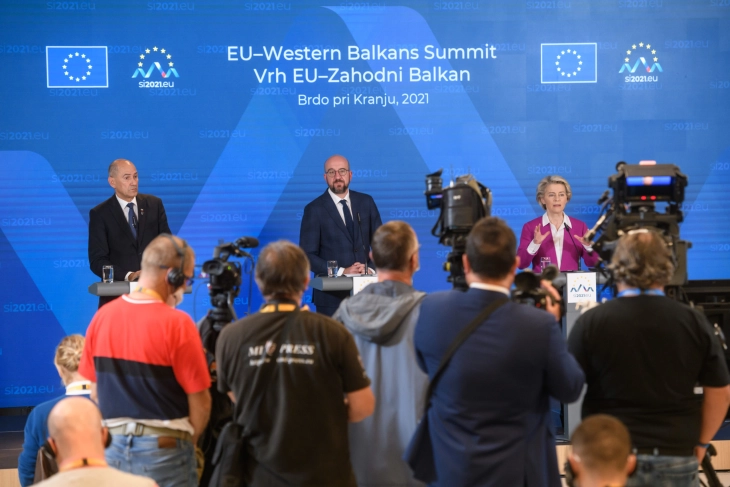EU sends mixed message to Western Balkan membership hopefuls
- Post By Magdalena Reed
- 18:25, 6 October, 2021

Kranj, Slovenia, 6 October 2021 (dpa/MIA) — EU division about welcoming new members from the Western Balkans into the bloc resulted in mixed messages at a summit in Slovenia, with promises once again of cash, but no quick accession prospects.
Albania, Bosnia-Herzegovina, Kosovo, Montenegro, North Macedonia and Serbia would all like to join the prosperous bloc - doing so would grant them access to the single market and freedom of movement - but did not get an indication of concrete progress on Wednesday.
With the 27 EU leaders meeting the heads of the six membership hopefuls, European Commission President Ursula von der Leyen called for clear messages of encouragement. But she also stressed that further reforms on the rule of law, judiciary independence and press freedom were needed.
"The European Union is not complete without the Western Balkans," the German politician and EU executive branch head told reporters at Brdo Castle near Ljubljana, "There cannot be any doubt that our goal is enlargement."
In a joint statement signed at the talks, the 27 EU states reaffirmed in writing for the first time their commitment to the stalled enlargement process first put on the cards almost 20 years ago. But no specific date was foreseen.
Leaders also stressed the need to focus on developing the 27-state union as it currently exists and for candidate countries to implement reforms, in a declaration reflecting the different schools of thought on when the six states should join.
Von der Leyen said frustration about the lengthy process to join the EU had been palpable in her recent tour of the region.
"The EU has to deliver," she said. In particular, the failure to start formal accessions negotiations with North Macedonia and Albania was jeopardizing the bloc's standing, said von der Leyen.
Latvian Prime Minister Arturs Karins, whose own country joined along with seven other former communist states in 2004, warned that "either Europe extends the hand and pulls these countries towards us, or someone else will extend the hand and pull the countries in a different direction."
Russia, China, and Turkey are investing heavily in the region. Von der Leyen said the EU must show it is the "favourite partner" of the six Western Balkan states. All save Albania were part of communist Yugoslavia, which was dissolved in the early 1990s.
In order to encourage reform efforts, Brussels is offering some 1.1 billion euros (1.3 billion dollars) in EU funds this year alone through an investment plan, the declaration explained. The commission is also to propose a new package of 600 million euros within this fund, according to the text. In total, about 30 billion euros are to be mobilized for the region over the next seven years.
Slovenia, which currently holds the rotating EU presidency, pushed unsuccessfully to have 2030 named as a goal in the document, but failed to get other member states on board with the idea.
German Chancellor Angela Merkel defended the omission of a concrete time frame for accession.
"I am not keen on a deadline that in the end just puts us under pressure," the conservative leader, generally sympathetic to enlargement, said after the summit.
Merkel said she was, however, in favour of the EU keeping its word, allowing countries to join if they met the agreed conditions.
Some members, like Austria, Croatia, Germany and Slovenia warn stalling too long push will destabilize the countries or send them elsewhere.
Others - particularly France, but also Denmark and the Netherlands - have misgivings about moving too fast. They point to regional issues such as crime and corruption, while questioning whether the EU is ready to absorb new members given the difficulty finding consensus among 27 members.
Objections in principle but also political squabbling have held up the bids of Albania and North Macedonia, in particular.
After making considerable and at times domestically difficult reforms both got the green light to start formal negotiations for membership in March last year, but opposition from France and Bulgaria in particular have held this up.
Bulgaria's veto - ongoing since late last year - relates to a dispute with North Macedonia linked national identity and language; the two have a shared history. Sofia also has a caretaker government, impeding policy change.
Albania and North Macedonia's EU accession bids are tied together, so Tirana's candidature is effectively frozen along with Skopje's.
Serbia and Montenegro have opened formal accession negotiations, which have ground to a halt. Belgrade has seen authoritarian backsliding under the presidency of Aleksandar Vucic.
Bosnia-Herzegovina and Kosovo are the furthest away, and are only classified as potential candidates.
Kosovo's prime minister, Albin Kurti, said he hoped that enlargement was part of the EU's essence as a post-World War II peace project. The "EU should keep enlarging so it becomes Europe. We are in Europe."
The EU leaders statement "could have been better," he said, but the bloc nonetheless remained our "our fate and destiny."







